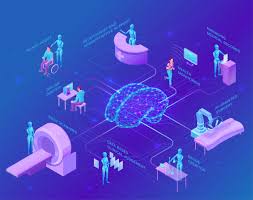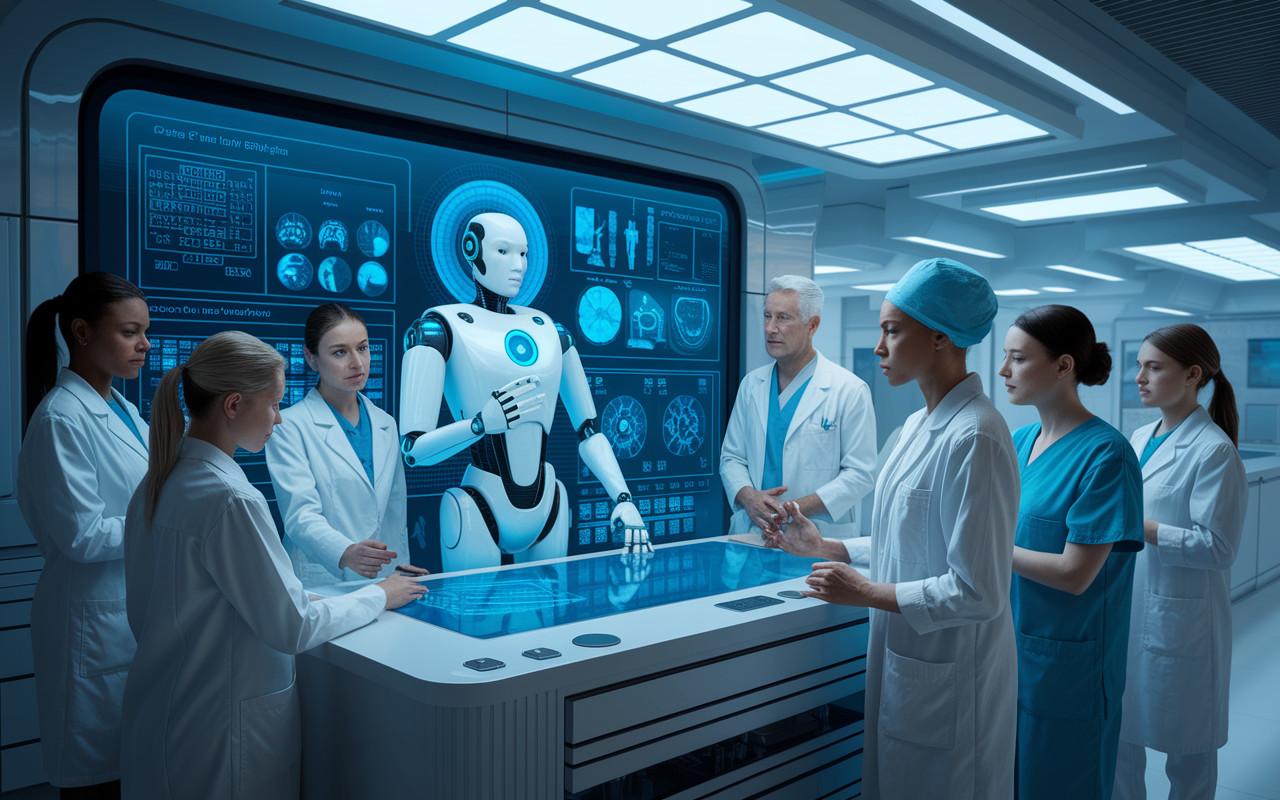The Role of AI in Transforming Healthcare
Artificial Intelligence (AI) is revolutionizing various industries, and healthcare is no exception. With its ability to process vast amounts of data and learn from it, AI is poised to enhance diagnostic accuracy, improve patient outcomes, and streamline hospital operations. This article explores the significant ways AI is transforming the healthcare sector.
Enhancing Diagnostic Accuracy
One of the most promising applications of AI in healthcare is its ability to improve diagnostic accuracy. Machine learning algorithms can analyze medical images such as X-rays, MRIs, and CT scans with remarkable precision. These algorithms are trained on thousands of images to identify patterns that may be invisible to the human eye. As a result, AI systems can assist doctors in detecting diseases like cancer at earlier stages, leading to more effective treatments.
Personalized Medicine
AI enables personalized medicine by analyzing an individual’s genetic information alongside lifestyle factors and medical history. By doing so, AI can help tailor treatment plans that are specific to each patient’s unique genetic makeup. This approach not only increases the effectiveness of treatments but also reduces the risk of adverse reactions.
Streamlining Administrative Tasks
Beyond clinical applications, AI is also making a significant impact on administrative tasks within healthcare facilities. Natural language processing (NLP) can automate routine documentation tasks such as transcribing doctors’ notes or managing patient records. This automation allows healthcare professionals to focus more on patient care rather than paperwork.
Predictive Analytics for Better Outcomes
AI-powered predictive analytics can forecast patient outcomes by analyzing historical data and identifying risk factors for diseases. Hospitals use these insights to implement preventive measures that reduce readmission rates and improve overall patient care quality.
The Challenges Ahead
Despite its potential benefits, integrating AI into healthcare comes with challenges. Data privacy concerns must be addressed to protect sensitive patient information. Additionally, there is a need for regulatory frameworks that ensure the safe and ethical use of AI technologies in medical settings.
The Future of AI in Healthcare
The future of AI in healthcare looks promising as technology continues to advance rapidly. Ongoing research and development will likely lead to even more sophisticated applications that further enhance patient care while reducing costs. As stakeholders work together to overcome challenges, AI has the potential to become an integral part of modern healthcare systems worldwide.
In conclusion, artificial intelligence holds immense potential for transforming the way healthcare is delivered and experienced. From improving diagnostics and personalizing treatment plans to streamlining operations and predicting outcomes, AI offers solutions that could lead to better health outcomes for millions globally.
Exploring AI in Healthcare: Benefits, Challenges, and Applications
- How is AI being used in healthcare?
- What are the benefits of integrating AI into healthcare?
- Are there any privacy concerns related to using AI in healthcare?
- How does AI improve diagnostic accuracy in healthcare?
- What role does AI play in personalized medicine?
- Can AI help streamline administrative tasks in healthcare facilities?
- What is predictive analytics, and how is it utilized in healthcare with AI?
- What are the challenges of implementing AI in the healthcare industry?
- How do regulatory frameworks address the use of AI technologies in medical settings?
How is AI being used in healthcare?
AI is being utilized in healthcare through a variety of applications that enhance both clinical and administrative functions. Clinically, AI algorithms are used to analyze medical images, aiding in the early detection and diagnosis of diseases such as cancer by identifying patterns that might be missed by the human eye. Additionally, AI supports personalized medicine by analyzing genetic information alongside patient histories to tailor individualized treatment plans. On the administrative side, AI streamlines tasks like managing patient records and scheduling, freeing up healthcare professionals to focus more on direct patient care. Furthermore, AI-driven predictive analytics help hospitals anticipate patient outcomes and implement preventive measures, ultimately improving overall healthcare quality and efficiency.
What are the benefits of integrating AI into healthcare?
Integrating AI into healthcare offers numerous benefits that significantly enhance the quality and efficiency of medical services. One of the primary advantages is improved diagnostic accuracy; AI algorithms can analyze complex medical data, such as imaging and genetic information, to detect diseases earlier and with greater precision than traditional methods. This leads to more timely and effective treatments. Additionally, AI facilitates personalized medicine by tailoring treatment plans based on individual patient data, including genetics and lifestyle factors, resulting in more effective care with fewer side effects. Furthermore, AI streamlines administrative tasks by automating routine processes like scheduling and documentation, allowing healthcare professionals to focus more on patient care. Predictive analytics powered by AI can also identify potential health risks in patients before they become critical, enabling proactive intervention. Overall, AI integration leads to better patient outcomes, increased operational efficiency, and reduced healthcare costs.
Are there any privacy concerns related to using AI in healthcare?
Yes, there are significant privacy concerns related to using AI in healthcare. The integration of AI technologies often involves processing vast amounts of sensitive patient data, including medical histories, genetic information, and personal identifiers. Ensuring the confidentiality and security of this data is paramount to prevent unauthorized access and data breaches. Additionally, there is a risk that AI systems could inadvertently expose personal information if not properly managed. To address these concerns, robust data protection measures must be implemented, such as encryption and access controls. Moreover, compliance with regulations like the Health Insurance Portability and Accountability Act (HIPAA) in the United States is essential to safeguard patient privacy while leveraging AI’s capabilities in healthcare settings.
How does AI improve diagnostic accuracy in healthcare?
AI improves diagnostic accuracy in healthcare by leveraging advanced algorithms and machine learning techniques to analyze medical data with precision and speed. These AI systems are trained on vast datasets, including medical images, patient records, and clinical studies, allowing them to identify patterns and anomalies that may be difficult for human clinicians to detect. For instance, AI can enhance the interpretation of radiological images such as X-rays, MRIs, and CT scans by highlighting potential areas of concern that require further examination. Additionally, AI tools can cross-reference symptoms with a comprehensive database of medical conditions to suggest possible diagnoses. This capability not only aids in early detection of diseases like cancer but also reduces the likelihood of misdiagnosis, ultimately leading to more accurate treatment decisions and improved patient outcomes.
What role does AI play in personalized medicine?
AI plays a crucial role in personalized medicine by enabling healthcare providers to tailor treatments to individual patients based on their unique genetic makeup, lifestyle, and medical history. Through advanced algorithms and machine learning, AI can analyze vast amounts of data from genetic sequencing, electronic health records, and other sources to identify patterns and predict how a patient might respond to specific treatments. This allows for more precise and effective interventions, reducing the risk of adverse reactions and improving overall outcomes. By leveraging AI, personalized medicine moves away from the traditional one-size-fits-all approach, offering customized healthcare solutions that are more aligned with each patient’s specific needs.
Can AI help streamline administrative tasks in healthcare facilities?
AI can significantly streamline administrative tasks in healthcare facilities by automating routine processes and improving efficiency. Technologies such as natural language processing (NLP) and machine learning algorithms are capable of handling tasks like transcribing doctors’ notes, managing patient records, scheduling appointments, and processing billing information. By reducing the burden of these time-consuming activities, healthcare professionals can focus more on patient care rather than administrative duties. Additionally, AI systems can help minimize human errors in data entry and documentation, leading to more accurate records and smoother operations within hospitals and clinics. Overall, the integration of AI into administrative workflows has the potential to enhance productivity and improve the overall quality of healthcare services.
What is predictive analytics, and how is it utilized in healthcare with AI?
Predictive analytics in healthcare involves using historical data, statistical algorithms, and machine learning techniques to identify the likelihood of future outcomes based on past information. In the context of AI, it leverages advanced algorithms to analyze large datasets from electronic health records, medical imaging, and other sources to predict patient outcomes and disease progression. For example, AI-driven predictive analytics can forecast which patients are at higher risk for developing certain conditions, such as diabetes or heart disease, allowing healthcare providers to implement early interventions. Additionally, hospitals use predictive analytics to optimize resource allocation by predicting patient admission rates and adjusting staffing levels accordingly. This proactive approach not only improves patient care but also enhances operational efficiency within healthcare facilities.
What are the challenges of implementing AI in the healthcare industry?
Implementing AI in the healthcare industry presents several challenges that need to be addressed for successful integration. One of the primary concerns is data privacy and security, as healthcare data is highly sensitive and must be protected against breaches. Ensuring compliance with regulations like HIPAA is crucial. Additionally, there is a significant need for high-quality, labeled data to train AI systems effectively, which can be difficult to obtain due to fragmented healthcare records. Another challenge lies in integrating AI technologies with existing healthcare infrastructure, which often involves outdated systems that may not easily support new innovations. Furthermore, there is a need for clear regulatory guidelines to ensure the safe and ethical use of AI in medical settings. Finally, gaining trust from healthcare professionals and patients is essential, as they must feel confident in the accuracy and reliability of AI-driven solutions. Addressing these challenges requires collaboration among technology developers, healthcare providers, policymakers, and other stakeholders.
How do regulatory frameworks address the use of AI technologies in medical settings?
Regulatory frameworks play a crucial role in ensuring the safe and ethical use of AI technologies in medical settings. These frameworks are designed to establish standards and guidelines that govern the development, deployment, and monitoring of AI applications in healthcare. Regulatory bodies, such as the U.S. Food and Drug Administration (FDA), assess AI-based medical devices for safety and efficacy before they can be widely implemented. They evaluate factors like data privacy, algorithm transparency, and potential biases to ensure that AI systems do not compromise patient safety or care quality. Additionally, ongoing post-market surveillance is often required to monitor the performance of AI technologies over time, allowing for adjustments as needed to maintain compliance with established standards. By addressing these aspects, regulatory frameworks help build trust among healthcare providers and patients in the adoption of AI solutions.


